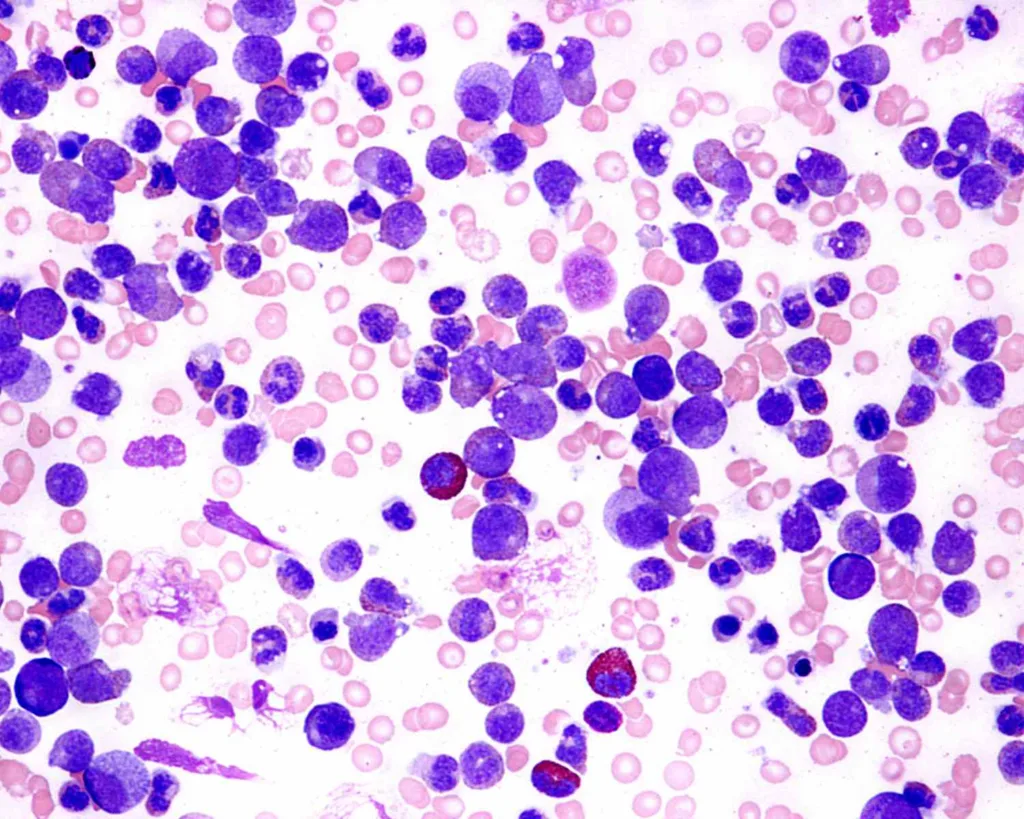Immature granulocytes, also known as bands or stabs, are a type of white blood cell that are produced in the bone marrow. These cells are not fully developed and are released into the bloodstream in response to an infection or inflammation.
A high level of immature granulocytes in the bloodstream is called a “left shift,” and it can be an indication of an underlying health problem. In some cases, a left shift can be a sign of a serious condition, such as leukemia or other blood disorders.
However, a left shift can also be a normal response to an infection or inflammation. When the body is fighting off an infection, the bone marrow produces more white blood cells, including immature granulocytes, to help combat the infection.
It is important to note that a high level of immature granulocytes alone is not enough to diagnose a particular condition. Other tests, such as a complete blood count (CBC) and a physical examination, may be necessary to determine the underlying cause of the left shift.
In addition to infections and inflammation, other factors that can cause a left shift include allergic reactions, autoimmune disorders, and certain medications. Pregnant women and newborns may also have higher levels of immature granulocytes.
If you have a high level of immature granulocytes, your healthcare provider may recommend additional testing to determine the underlying cause. Treatment will depend on the specific condition, but may include antibiotics, anti-inflammatory medications, or other therapies.
A high level of immature granulocytes in the bloodstream can be a sign of an underlying health problem, but it can also be a normal response to an infection or inflammation. If you are concerned about your white blood cell count, it is important to speak with your healthcare provider to determine the underlying cause and develop an appropriate treatment plan.
The Meaning of Immature Granulocyte ABS
Immature granulocyte ABS, or absolute immature granulocyte count, is a measurement of the number of immature granulocytes present in a person’s bloodstream. Granulocytes are a type of white blood cell that helps the body fight infection, and immature granulocytes are newly formed cells that have not yet fully developed into mature cells.
If an individual has a high immature granulocyte ABS, it may indicate that their bone marrow is producing more immature granulocytes in response to an infection or inflammation. However, a high count can also be a sign of a more serious condition, such as leukemia or myelodysplastic syndrome (MDS).
On the other hand, a low immature granulocyte ABS may suggest that the bone marrow is not functioning properly and is not producing enough white blood cells to fight infection. This can be caused by various factors, such as chemotherapy, radiation therapy, or certain medications.
It is important to note that the interpretation of an immature granulocyte ABS result sould be done in conjunction with other laboratory tests and clinical information. Your healthcare provider can help you understand your test results and determine if further testing or treatment is needed.
Immature granulocyte ABS is a measure of the number of newly formed granulocytes in the bloodstream. A high count can indicate infection or a more serious condition, while a low count can suggest bone marrow dysfunction. Consulting with a healthcare provider is recommended for proper interpretation and management of test results.

Causes of High Immature Granulocyte ABS Levels
Immature granulocytes, also known as band cells or bands, are a type of white blood cell that is produced in your bone marrow. They are called “immature” because they have not yet fully developed into mature white blood cells, such as neutrophils, eosinophils, and basophils.
If your blood test shows high levels of immature granulocytes, it could be an indication of a problem with your bone marrow. This could be caused by a variety of factors, including cancer, infections, or other medical conditions that affect blood cell production or function.
In addition, high levels of immature granulocytes can also be a sign of an active infection, as your body produces more white blood cells to fight off the invading pathogens. This is often seen in cases of bacterial infections, such as pneumonia or sepsis.
Other possible causes of high immature granulocyte levels include allergic reactions, autoimmune disorders, and inflammation from an underlying health condition.
It is important to note that high levels of immature granulocytes can also be normal in some situations. For example, pregnant women and newborns often have higher levels of these cells.
If you have high levels of immature granulocytes in your blood, it is important to consult with your healthcare provider to determine the underlying cause and apprpriate treatment.
Infection Causing Immature Granulocytes
Immature granulocytes, also known as band cells, are often seen in the bloodstream when the body is fighting an infection. This can be a sign of a bacterial infection, as the bone marrow is producing more white blood cells in response to the presence of bacteria.
Some specific types of bacterial infections that can cause an increase in immature granulocytes include:
1. Sepsis: This is a serios bacterial infection that can lead to septic shock if left untreated. It can cause an increase in both immature and mature granulocytes.
2. Urinary tract infections: These are bacterial infections that affect the urinary system. They can also cause an increase in immature granulocytes.
3. Pneumonia: This is a bacterial infection of the lungs that can cause an increase in band cells.
4. Osteomyelitis: This is a bacterial infection of the bones that can also cause an increase in immature granulocytes.
It is important to note that viral infections and other types of inflammatory diseases can also cause an increase in granulocytes, but typically not immature ones. If you are experiencing symptoms of an infection, it is important to seek medical attention to determine the underlying cause and receive appropriate treatment.
High Levels of Immature Granulocytes
Immature granulocytes, also knon as bands, are a type of white blood cells that are produced in the bone marrow and are released into the bloodstream during an infection or inflammation. The normal range of immature granulocytes in the blood is less than 2%.
However, if the percentage of immature granulocytes in the blood is more than 2%, it is considered a high level. This condition is also known as bandemia or a left shift. It indicates that the bone marrow is producing more immature granulocytes to fight an infection or inflammation in the body.
A high level of immature granulocytes is often seen in bacterial infections, sepsis, and other inflammatory conditions. It can also be a sign of leukemia or other blood disorders. Therefore, it is essential to consult a healthcare provider if you have a high level of immature granulocytes in your blood.
A high level of immature granulocytes is considered to be more than 2% and can indicate an underlying medical condition that requires medical attention.

Conclusion
High levels of immature granulocytes in the bloodstream can be indicative of a problem with the bone marrow or an early-stage response to infection. While this can be a cause for concern, it is important to note that there are a variety of factors that can contribute to increased levels of these white blood cells, including inflammatory diseases, bacterial or viral infections, and sepsis. It is critical to consult with a healthcare provider to determine the underlying cause of any abnormal blood test results and to receive appropriate treatment. Additionally, it is worth noting that while high levels of immature granulocytes can be a sign of a serious health condition, they are also a normal part of pregnancy and newborn development. Thus, it is important to consider the context in whch these results are obtained and to rely on a trained medical professional to provide a proper diagnosis and treatment plan.
